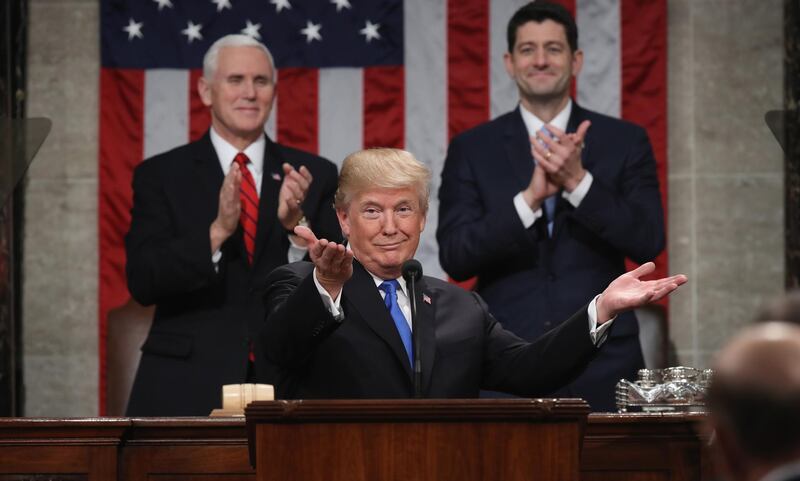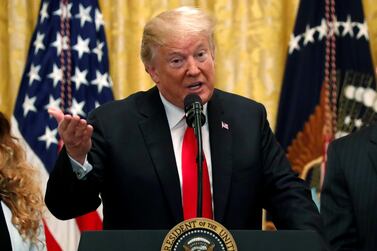The State of the Union address is steeped in tradition. Throughout history, for one night only, Republicans and Democrats have put their grievances aside in a spirit of national interest, coming together to hear the US president speak about the achievements of the past year and his plans for the next one. It is a quaint concept, thick in ceremony, but on the eve of this year's edition the veneer of its founding principles is wearing anorexically thin. Unity is absent.
Although the speech was originally conceived as the president's annual report card to both houses of Congress it has become a spectacle tailored for a television audience. The aura remains but American politics has changed so dramatically that such a gathering currently seems a little outdated.
To understand President Donald Trump's political intentions, or at least his opinions, one would not need to tune in at 9pm Washington time on Tuesday. A read of his Twitter feed reveals a more authentic version of how he looks at the world. Has he kept his campaign promises and Made America Great Again? The past two years tell us plenty.
Mr Trump presides over a strong economy, with the lowest unemployment in 50 years, although he inherited much of this from Barack Obama, and has added one trillion dollars to the national debt as a result of tax cuts that benefited the rich more than ordinary working families.
Through Executive Order 13769, titled Protecting the Nation from Foreign Terrorist Entry to the United States, Mr Trump banned citizens from a list of predominantly Muslim countries from travelling to America. At a time when they needed sanctuary Syrian refugees were singled out for non-entry, to global astonishment.
At home, Mr Trump has appointed Neil Gorsuch and Brett Kavanaugh as Supreme Court judges, the latter despite an outcry and public testimony about sexual assault allegations. He has praised Russian President Vladimir Putin while alienating European allies and threatened to pull America out of Nato, the post-Second World War defence pact meant to protect the West from Moscow. After meeting Mr Putin in Helsinki last July the American president was accused of treason over his willingness to accept the Russian leader's assurances that there was no Soviet meddling in the 2016 election. Since then, special counsel Robert Mueller has uncovered criminality among several Trump aides. The convictions of former acolytes such as Michael Cohen and Paul Manafort as well as lower-level campaign staffers are a dark shadow over the White House. The Russia investigation continues. On a more personal level, and having initially denied it, the president conceded that hush money was paid during the election campaign to two women over affairs they said they had with him. Yet Mr Trump is just getting started, his team says.
So far, he has failed to build a wall with Mexico but he has separated the children of migrants from their parents. His drawing of moral equivalence between white supremacists and anti-fascist protesters in Charlottesville stands as a measure of his willingness to pander to supporters rather than call out wrongdoing. Mr Trump calls the press "Enemies of The People" who spread Fake News. Yet Fact Checker, run by The Washington Post, shows that the president made 8,158 false or misleading claims in his first two years in office – 6,000 of them in the past 12 months, amounting to 16.5 such statements per day.
Accordingly, it would be naive to consider this year's State of the Union as an opportunity for Mr Trump to reach out to those who either did not vote for him or have since had cause to doubt his suitability for office. Yet that is exactly what reporters were asked to believe last week.
A White House aide said Mr Trump would call for unity in the speech, following the recent government shutdown. As has become normal, the briefing's content was exposed as worthless a day later when the US president in an interview gave a probably more accurate heads-up on what he is likely to talk about – immigration and his determination to build the wall with Mexico, the divisive issue that prompted the 35-day partial closure of the government in the first place. Another closure looms on February 15 when a short-term funding bill expires. Unless there is money forthcoming for the wall the talks with Democrats on a new bill will have been “a waste of time”, Mr Trump said on Friday. And so goes the cycle: Mr Trump's aides say one thing, he says the opposite.
It is the unbuilt wall that makes this year's State of the Union particularly difficult to take seriously.
When Mr Trump takes the podium sitting behind him will be Nancy Pelosi, speaker of the House of Representatives, alongside Vice President Mike Pence. Rarely will there have been a more incongruous trio at the event. When Mrs Pelosi no doubt applauds the president numerous times as he delivers his remarks, as is customary, no one will believe she means it.
Such is the state of America. Divided, and insincere.
The bigger matter in question is how much worse will this dispute and others in Washington get in the next two years?
Having reluctantly re-opened the government after failing to receive one dollar for the wall while 800,000 employees went without pay, Mr Trump insists it will be built. His declaration comes despite Mrs Pelosi reiterating her opposition in recent days.
The world has become accustomed to such dysfunction. We should expect more of the same in the second half of Mr Trump's presidency. Those who opined at his inauguration in 2017 that Mr Trump would “grow into the job” as the importance of office outweighed his ego were wrong. The US president's voracious need for validation, at the age of 72, appears, if anything, to be growing.
On Friday, he again took aim at the media's “very unfair” treatment of him, and openly misrepresented the views of those he appointed to lead the CIA, the FBI and the head of National Intelligence. Presumably Mr Trump did so secure in his own mind that it did not matter if those same officials had appeared in public on Capitol Hill and given a very different estimate of the threats facing the United States than the incumbent of the Oval Office wished to. Only Fox News “treats me very well”, Mr Trump said, blaming the media for the contradictions in global security policy and other disagreements.
It is such an environment that led his former chief of staff Gen John Kelly to describe the Trump White House as "Crazytown". Mr Trump's talent at creating media diversions has been helpful. He is a social media president who gave up his role in The Apprentice to become the lead character in a real life House of Cards. He is immune to challenge, as his dismissal of former secretary of state Rex Tillerson, the recent resignation of defence secretary James Mattis and a long list of departures from his administration show. Sooner or later he disregards advice that does not accord with his views.
Mr Trump's outspokenness and lust for the limelight has propelled him this far. He likes to talk about winning and frequently calls his opponents losers. The shutdown for the first time, however, showed that his brand is losing steam, even among its most devoted followers. Surveys indicate that more people blamed the president than Mrs Pelosi for the closure of government. A similar poll during the shutdown is said to have led Mr Trump to say that his administration was “getting crushed”. So fond is he of ratings that they dominate his attention when little else seems able to do so.
The most recent Washington Post/ABC poll last week showed that disapproval of the president hit 58 per cent. The numbers who approved of his performance fell to 37 per cent. Polls consistently show that a majority of Americans do not support the wall and its initial $5.7 billion projected cost. Yet that is what Mr Trump wants.
Until last month, the president had enjoyed Republican majorities in both the Senate and the House of Representatives. He lost the latter in midterm elections. Mrs Pelosi is determined to block the White House's plans. The cycle has become customary.
So whatever Mr Trump says on Tuesday night, do not expect any of it to happen. In an age of political entertainment led by its most famous proponent the details will only become clear after another false display of unity has ended and people's televisions have been switched off.







